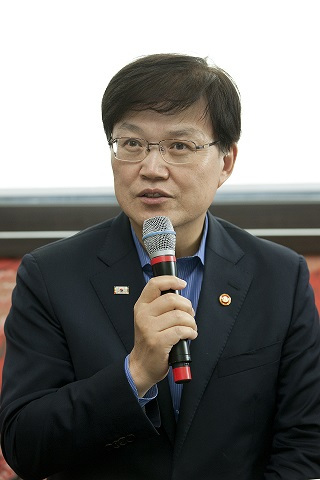ICT Minister Choi Yang-hee said Friday that a government measure to curb overheated competition in the Korean wireless industry has yielded positive results.
“No one would deny that the Mobile Device Distribution Improvement Act has achieved its initial goal of resolving discrimination against consumers,” said the ICT minister in a press meeting in Gwacheon, Gyeonggi Province, dismissing claims that the act has undermined the global competitiveness of Seoul-based handset-makers such as Samsung Electronics, LG Electronics and Pantech.
The press meeting was held to mark the first anniversary since he took his ministerial post on July 16 last year.
 |
ICT Minister Choi Yang-hee talks at a press meeting held in Gwacheon Friday. (ICT Ministry) |
In order to root out the practice of illegal subsidies, the ICT Ministry and the Korea Communications Commission in October implemented the new law, which limited standard subsidy rates to 330,000 won ($286).
Some market watchers argued that the government measure to stop mobile carriers and manufacturers from doling out high subsidies to attract consumers caused Korean smartphone firms to lose ground to foreign smartphone-makers, especially California-based Apple.
“The government act did not benefit Apple,” said Choi. “Many statistics also show that the mobile market did not take a downward turn due to the act.”
The market share of Apple’s iPhones in Korea increased from 6.6 percent in October to 34.2 percent in November, while that of Samsung dropped from 68.3 percent to 47.7 percent during the same period, according to a report compiled by research firm ATLAS Research and Consulting. LG saw its market share decrease from 22.1 percent to 11.5 percent over the cited period.
Some market researchers anticipated that Apple’s market share crossed the 40 percent mark this month.
As for the ministry’s plan to introduce a new wireless carrier in the local mobile industry, he said “diversification” would eventually bring positive effects to the market.
“The nation’s fourth mobile carrier would invigorate the market with more diverse services and help the domestic mobile industry be able to grow further and take the global lead in new businesses, such as the Internet of Things, via (healthy) competition,” he said.
Announcing plans to galvanize the Korean economy for the latter half this year, the ministry vowed to pick up the pace for its drives to create jobs and promote entrepreneurship across the nation — part of the Korean government’s flagship creative economy policy.
Among the initiatives are supporting small and medium-sized enterprises to tap into global markets, preparing long-term measures to beef up research and development projects across industries, and establishing a road map for the development of future technologies such as unmanned aerial vehicles and the 5G telecommunications network.
By Kim Young-won (
wone0102@heraldcorp.com)








![[Weekender] Korea's traditional sauce culture gains global recognition](http://res.heraldm.com/phpwas/restmb_idxmake.php?idx=644&simg=/content/image/2024/11/21/20241121050153_0.jpg)